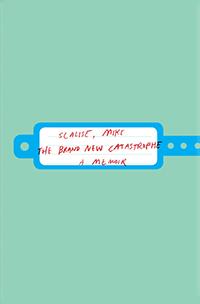
There’s a scene in Mike Scalise’s The Brand New Catastrophe where Scalise, twentysomething and struggling to find full-time work in New York City, arrives in Central Park for a job interview. In short, it’s a catastrophe. Scalise, having spent days imagining this job—and its benefits package—as his last chance, a final lifeline into honorable employment and actual health insurance, arrives sickly with nerves. Distracted by an errant German shepherd, he admits to the interviewer that he just “wants a job, any job.” She gives him the look, an expression of resigned disapproval Scalise practically majored in. Further answers are met with only a “placating menu of hmms and okays.” Desperate, he hands the interviewer a portfolio of writing: profiles of Pittsburg bands and the owners of Italian delis. “Very good,” she says, flipping through without interest. “Very nice.” The look again. And so he does it, falling back on “the only strategy that had worked in the last six months to make anyone interested in [him], about anything.”
That is, Scalise tells the story of his illness: a litany of exploding tumors, hormonal oddities, and ironically named doctors, peppered with jokes that—just a few months out from his diagnosis—are already old to him. This is when Scalise (an acromegalic who has taken perverse delight in laying clues of his condition throughout his apartment, a man who stole and wore his hospital pajamas for months after his initial treatment) realizes that there are improper contexts for catastrophe narratives. The interviewer, feigning sympathy, or—maybe worse—expressing real pity, excuses herself as soon as possible, the promise of one kind of salvation leaving with her.
Throughout his memoir, Scalise presents himself as a scholar of disaster narratives. He becomes “a human way station of pituitary factoids, a cataloger of stories about growth hormone and brain tumors . . . .” His is a disease of the Google age, where we treat the violence of sudden diagnosis with the balm of obsession, filling breaches in our identities with what we find with the search bar. The writer’s investigation is wide; he reaches for the early journals of acromegalics, the lore of nuclear age monster movies, the spectacle of early reality shows. It is the associative impulse desired in essay, though contained. What emerges is not the social history of a disease, but rather the portrait of a digressive narrator searching for self meaning. For Scalise, acromegaly—a cousin of gigantism—is more than a brain tumor discovered when he was only twenty-four; it’s more than his body’s refusal to produce its own hormones and his lifelong reliance on a few expensive specialists. It is the idea of alteredness: it is hours spent searching the mirror for acromegaly’s characteristic distended jaw; the specter of André the Giant’s face spray-painted across the city; the ghostly sightings of strangers he passes who, perhaps undiagnosed, bear the same recognizable traits.
Yet, despite his careful tracking of his own illness, Scalise’s memoir is not the narrative of a catastrophe. Our setting, apart from a few initial scenes, is not the hospital; we are spared its fluorescent melodrama, its sterile call to live differently. Scalise’s acromegaly is more recognizably a strain of Seneca’s asthma or Susan Sontag’s cancer. It is a point of departure for a work that is as much about idleness, the slow progression of treatment without climax, and the ways in which we form identities that embrace, as much as resist, what inflicts us. In one sublime passage, Scalise—not beyond using his reliance on artificial hormones as an opportunity to experiment—takes himself off testosterone. What results is chillingly Zen: the contours of a life stripped of some of its fallible passions—an explication, in miniature, of an aspect of maleness that still clings to the primordial.
Our hormones are routines; they are what is animal in us—what we rely upon and yet dismiss for the illusion control. Maybe what The Brand New Catastrophe best charts is a man’s struggle to regain routine; the temperament it requires to navigate medications; the domestication of a relationship once conceived of in opposition to the normal order; and the ways in which, in order to master life’s disruptions, we elevate them into towering ideas.
The Brand New Catastrophe
Mike Scalise
Sarabande Books, 2017
$15.95; ISBN 9781941411339
260 pages
